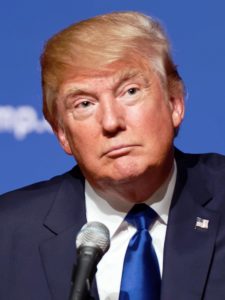After the banning of Trump, “make social networks great again”.

Michael Vadon, Donald Trump at the New Hampshire Town Hall at Pinkerton Academy, August 19th, 2015, CC-BY-SA, https://commons.wikimedia.org
It didn’t take three days after the events on Capitol Hill for major social networks to decide to permanently close or indefinitely suspend the accounts of outgoing President Donald Trump. This is the culmination of a long process.
The first step was to explain that a social network cannot come between the source and the recipients of a political speech: if they find the speech problematic, Zuckerberg explained, it is up to the voters to exercise moderation through the ballot box. The second step was to leave the President’s publications online, but to accompany them with warning messages when they were misleading or to curb their circulation by banning sharing. The third and final step was to remove Mr. Trump’s digital megaphones.
In recent months, the platforms involved have not taken strictly the same positions or reacted at exactly the same time, but it is clear that each has kept an eye on its competitors. Observe the flight of the wild geese: the one that leads cannot get too far ahead, and those that follow must not be left behind, otherwise they will be too exposed to the bad winds of public opinion. After their latest initiatives, the networks have indeed heard as much applause as booing. There is a consensus on one point: these private companies hold immense power over the course of the democratic debate. But some people then believe that these companies have built their user network with the sweat of their brow, that they are masters in their kingdom and free to apply their rules, the famous “terms of service”. Others consider that Twitter or Facebook are nothing more than vehicles transporting their users to the “public square”, which belongs to no one but society as a whole.
One day, while I was a student, a professor told us about his doctoral thesis defense. In a footnote, he had imagined, for the purposes of a demonstration, that nuclear fire was coming down on the city of Strasbourg. A skeptical member of the jury had asked him if such eccentricity was indeed necessary. The candidate replied: “The law sometimes needs extreme hypotheses in order to progress”. There is therefore one and only one thing for which Donald Trump has a right to our gratitude: going beyond the most daring thought exercises in reality, he will have allowed American constitutional law and the right of social networks to progress.
It will take time to draw all the lessons from the sequence that has just ended. On the spot, we will make the following observations, from the point of view of French and European law, not American law.
The social network, master in its kingdom?
The definitive closure of Mr. Trump’s Twitter account has been all the more striking because it has taken as a pretext messages of relatively anodyne appearance: one in which he announces that he will not participate in Joe Biden’s investiture ceremony; another in which he qualifies the people who voted for him as “patriots”. After years of letting much more problematic content from the same author slip through, Twitter painfully justifies its decision by explaining that it would be a veiled incitement to violence. “I’m not going to be at the inauguration because it’s not going to go well,” Trump is supposed to say, “so I hope it doesn’t go well,” “so I urge you to restart your Capitol exploits”.
It is clear that the platform seeks both to take advantage of the momentum created by the events of Congress, and to make up for late conduct, rather than to interpret in good faith those messages in which a neutral observer would find it difficult to detect the slightest tangible threat.
This is only possible because social networks act on the basis of their “terms of service” (TOS), which allow them to be at once legislator, judge, jury and executioner. From this point on, nothing prevents them from moving abruptly from blind clemency to implacable severity. It certainly happens that the platforms spontaneously set up appeal mechanisms… which will then have the scope and effectiveness that we would like to give them. For example, Facebook’s famous “Supreme Court”, which will certainly make fascinating decisions about the ten publications per year that will be referred to it, but whose existence is above all a manifesto: “we don’t need the Justice of the State, we are our own Justice”.
To justify this position, many commentators in recent days have appealed to the rhetoric of the private club: at the entrance to the nightclub, the bouncer lets in whoever he wants. My property, my rules. Florence G’sell explains that this point of view is largely valid in American law.
This discourse has been rightly fought. Laurent Chemla sees social networks as “providers of freedom of expression” forming an oligopoly, which would place particular constraints on them in the general interest.
The weakness of this approach, which is very interesting, is that it only targets the dominant players of the moment. A social network dedicated to addressing the general public but meeting, temporarily or permanently, only limited success, would not be part of this “oligopoly” that controls the bulk of online communication. Would it then escape the constraints? Where to set the bar for success? Should a network less known to the general public as “Talking” have a different status from Twitter or Facebook?
It seems important to defuse the “my private property, my rules” discourse in an even more fundamental way. It simply does not correspond to reality. Even offline, a private establishment receiving the public is absolutely not free within its walls. The nightclub bouncer cannot turn away customers because of their skin color, even if this discrimination would have been provided for in the internal regulations. In the layout of his club, the owner will have to take into account multiple regulations concerning the ventilation of the premises, the location and surface area of the toilets and the signage of emergency exits.
There is a hierarchy of standards. The contract (because the TOS are obviously contracts) is subject to rules of a higher value, such as those resulting from international treaties or the law.
Even if a social network’s TOS would tolerate hate speech, no one would be surprised if the state forced the removal of racist or homophobic publications. This is the angle from which the question most often arises: forcing an inert platform to act. In the Trump case, the pattern is the opposite: can a zealous social network be prevented from acting, on the basis of texts superior to the TOS?
The question has already been asked, but without attracting enough attention, for example when Facebook prevented the publication of Gustave Courbet’s painting “The Origin of the World” on the pretext that it would constitute pornographic content. The court had decided that this censorship was at fault.
The lesson is clear: the TOS is framed from the top and from the bottom, the law (in the broadest sense) can prevent the inertia of the social network as well as its zeal. Let’s see more precisely how these principles can be applied in Donald Trump’s case.
“A president should not say that”
Some commentators have suggested an analogy with the “right to dereferencing” recognized by the European Court of Justice in the “Google Spain” case. Recall that this is a right to obtain from a generalist search engine, such as Google Search, that it removes a link leading to content that the person concerned deems obsolete, outdated, dishonorable, harmful to his or her image (full presentation here). What does this have to do with the Trump case? Removing the search result pointing to a content contributes to decrease its visibility: it is a form of censorship. However, in its major decision, the ECJ orders that the decision to withdraw the search result be taken after balancing the interests involved. In a pan of the scale, the right to privacy and the protection of personal data of the individual concerned. In the other pan, the public’s right to information, the intensity of which increases greatly when the person concerned plays “a public role”.
Thus, the public role played by an individual confers a greater interest in the information concerning him or her and justifies altering its visibility with much greater reluctance.
The reader might think that he or she has identified a paradox. In “Google Spain”, the notoriety of the individual diminishes his or her rights to privacy and the protection of personal data. In the Trump case, it would extend his right to freedom of expression? This analysis does not seem correct. At least in French and European law, a political figure would obviously have no more “right” to incite violence or utter racist remarks than an ordinary citizen. But the question is not this: without prejudice to possible subsequent civil or criminal proceedings, should the social network deprive the remarks made of visibility? In Google Spain, as in the Trump case, the answer lies in the public’s right to information, which shows a particular intensity when the content concerns a personality. Let’s imagine, as a school hypothesis, that a French minister makes racist remarks, isn’t it in the general interest – including and perhaps especially for his opponents – that such remarks remain visible and can integrate the public debate? But let us return to Donald Trump: not to the messages that finally earned him the ban, but to earlier speeches. If they result in the risky behavior of hundreds of thousands of people in times of pandemic, or incite people to take up arms against the outcome of a democratic election, perhaps the interest in public debate should give way to the dangers to human life.
At this stage of reasoning, the applicable standards are no longer the main difficulty. It is no longer a question of applying TOS but of articulating complex fundamental freedoms between them. The question then is no longer what are the rules, but who should apply them?
Moderators or judges?
A few weeks ago, after the terrible Paty affair, some of the political staff demanded that platforms be more aggressive in their content moderation. It was claimed that some videos of parents of students criticizing Samuel Paty’s pedagogy should have been removed early to avoid the dramatic chain of events that led to the assassination. In a previous post, we had recalled the rule laid down by the Constitutional Council: platforms should only act without a court order when faced with clearly illegal content. This was probably not the case with the incriminated videos.
Therefore, we wrote, it was necessary to put in place mechanisms for rapid judicial decisions, in order to finely articulate fundamental freedoms with an authority and legitimacy that are the prerogative of the magistrate.
Today, it is no longer inertia but zeal that is blamed on social networks. Our answer remains the same. The withdrawal of content – and a fortiori the suspension or final closure of accounts – from political leaders at the highest level obviously raises a serious difficulty of interpretation of the standards. This difficulty, as explained above, no longer depends on the content but on the author of the messages, which gives greater weight to the public’s right to information. This in no way prohibits sanctions, but they cannot be pronounced by private actors acting alone.
The major digital players can continue to be blamed for the excessive power they enjoy. But this power only thrives because it is not curbed by the States. With the Digital Services Act project, Europe is trying to regain control in this area. On a French scale, recruiting and training a few hundred magistrates capable of constituting a rapid reaction force on these issues is an essential investment. In France too, public debate has moved online, where it is subject to the constant onslaught of lies and hatred. In France too, democracy is hanging by a thread.
Emmanuel Netter, professor of private law at the University of Avignon
Feel free to comment on this article or to contact me.
Useful readings (in french)
- Guillaume CHAMPEAU, “Réguler les réseaux sociaux en préservant l’idéal démocratique“
- Laurent CHEMLA, “La chute”
- Olivier ERTZSCHEID, “Trump et Twitter : fermez le (kick)ban”
- Raphaël GRABLY, fil Twitter
- Florence G’SELL, fil Twitter
- David LEGRAND, “Intrusions au Capitole : après le show de Trump, les plateformes gèlent ses comptes“
- Damien LELOUP et Alexandre PIQUARD, “« Trop, c’est trop » : l’heure de vérité pour Twitter, Facebook et YouTube face aux comptes de Donald Trump“

